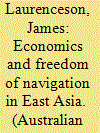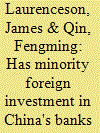| Srl | Item |
| 1 |
ID:
095935


|
|
|
|
|
| Publication |
2010.
|
| Summary/Abstract |
The existing literature that discusses China's macroeconomic volatility during the reform period does so with overwhelming reference to the business cycle. However, the business cycle is only a subset of macroeconomic volatility that occurs within a particular frequency band. In this paper we decompose various macroeconomic series by frequency and find that much volatility occurs at lower than business cycle frequencies. This suggests that it is necessary to look beyond the construct of the business cycle in order to understand the nature of China's macroeconomic volatility, and beyond the usual demand side explanations in the discussion of causes.
|
|
|
|
|
|
|
|
|
|
|
|
|
|
|
|
| 2 |
ID:
154807


|
|
|
|
|
| Summary/Abstract |
Public calls for a more aggressive regional response to China’s pressing of its territorial claims in the South China Sea are typically couched in terms of the threat posed to freedom of navigation. Yet this invites an obvious question: If freedom of navigation, a vital interest for nearly every country in the region, is at risk, why has the regional response to China’s actions to date been so limited? This article argues that one compelling explanation lies in the economics of freedom of navigation in East Asia. Put simply, the risks of freedom of navigation being impeded are frequently overstated, and a more sober assessment of these risks can reduce the incentive that countries have to take more dramatic action.
|
|
|
|
|
|
|
|
|
|
|
|
|
|
|
|
| 3 |
ID:
081897


|
|
|
|
|
| Publication |
2008.
|
| Summary/Abstract |
Since 2001, foreign investors have been permitted to acquire minority ownership stakes in China's banks. This paper assesses whether there is any evidence of a cost efficiency payoff in those banks that have taken on foreign investment. Data envelopment analysis is first used to generate measures of cost efficiency for China's banks over the period 2001-2006. A second stage regression is then performed to determine whether foreign investment has an impact on cost efficiency. The results indicate a positive relationship, although one that is not statistically significant. Policy implications are discussed
|
|
|
|
|
|
|
|
|
|
|
|
|
|
|
|
| 4 |
ID:
190706


|
|
|
|
|
| Summary/Abstract |
Perceived threats to sovereignty stemming from trade exposure to China have led to calls for the Australian government to embrace the concept of ‘trusted trade’. This involves using policy levers to drive trade towards markets that have capitals more geopolitically aligned with Canberra and finds practical expression in forms such as ‘friend-shored’ supply chains. A theme of ‘trusted trade’ advocacy is the conscription of existing security-oriented partnerships, including the ANZUS alliance, the Quad grouping and the Five Eyes intelligence-sharing arrangement, to take on economic dimensions. While holding superficial appeal, this paper details why pursuing this policy path would be to learn the wrong lessons from Beijing’s campaign of trade disruption that began in May 2020, and make Australia both poorer and less secure. Three key data points are highlighted that collectively support an assessment that the Australian government’s traditional trade policy approach, emphasising open regionalism, remains overwhelmingly fit for purpose.
|
|
|
|
|
|
|
|
|
|
|
|
|
|
|
|
| 5 |
ID:
134854


|
|
|
|
|
| Summary/Abstract |
Productivity and efficiency change lies at the heart of achieving sustainable growth in China. This paper computes and decomposes provincial-level Färe–Primont TFP indexes for the period 1978 to 2010. On average across provinces, we find evidence of rapid TFP growth mostly due to technical change, but with changes in scale–mix efficiency also playing a supplementary role. Considerable heterogeneity from province to province is also documented both with respect to the rate of TFP growth and its components. Policy implications are discussed.
|
|
|
|
|
|
|
|
|
|
|
|
|
|
|
|
| 6 |
ID:
077185


|
|
|
|
|
| Publication |
2007.
|
| Summary/Abstract |
Capital account convertibility in China is on the rise. In this paper we consider the impact that removing remaining capital controls might have on the volume of China's international capital flows. Better understanding of this capital flow response can shed light on China's current degree of international financial integration, which has important implications for policy decisions such as whether China should move toward a more flexible exchange rate regime. It is also relevant to discussing the financial stability consequences of removing remaining capital controls. The main finding is that China's capital account is already quite open, thus implying a tradeoff presently exists between exchange rate stability on the one hand and monetary independence on the other. In terms of financial stability, the results generally serve to allay fears that further opening the capital account would compromise China's international payments ability or disrupt global capital flows.
|
|
|
|
|
|
|
|
|
|
|
|
|
|
|
|
| 7 |
ID:
090107


|
|
|
|
|
| Publication |
2009.
|
| Summary/Abstract |
Economic theory posits numerous channels through which FDI might create positive spillovers for domestic firms. However, the results of empirical studies that have sought to document these spillovers have been mixed. One explanation for this variation is that the capacity of domestic firms to absorb spillovers might vary. In the present paper, we explore these issues in the case of China. Aside from being one of the world's leading hosts of foreign direct investment, China makes for an interesting case study because its provinces vary greatly with respect to those factors most commonly held to influence absorptive capacity, such as the initial level of technology in domestic firms. This paper begins by empirically establishing that the spillovers from foreign direct investment do indeed vary across provinces. Threshold values for various factors that influence absorptive capacity factors are then estimated and it is found that conditions in many provinces presently fall short of these values. This provides an obvious focus of attention for China's policy-makers.
|
|
|
|
|
|
|
|
|
|
|
|
|
|
|
|